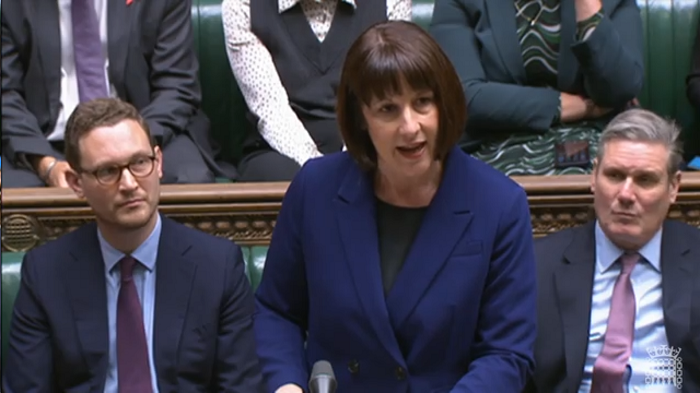Chancellor Rachel Reeves is reviewing the previous Conservative government’s New Hospital Programme and has dropped its plan to cap lifetime social care costs at £86,000.
She also confirmed the next Budget will take place on 30 October and committed to just one major fiscal event per year.
Reeves (pictured) told Parliament this afternoon that a set of non-negotiable fiscal rules will be confirmed on that date in October, alongside further “difficult” decisions on tax and spending.
HM Treasury confirmed that finalised departmental budgets for this financial year and the next will be confirmed in October and a multi-year Spending Review will conclude in Spring 2025 to embed “mission-led” government and transform public services.
Reeves pledged to “restore economic stability” after revealing £22bn of unfunded pressures inherited from the previous Conservative government.
Findings from a Treasury audit commissioned by the chancellor found billions of pounds of unfunded commitments from the previous government, including the Rwanda scheme, the Advanced British Standard and the New Hospital Programme.
It further found the previous Tory government had failed to increase departmental budgets to cover public sector pay settlements, which were £11-12bn higher than accounted for at the last Spending Review.
Consequently, the chancellor announced £5.5bn of savings this year and £8.1bn next year to tackle the overspend. She also committed to set out full fiscal plans, alongside a Spending Review, at the Budget on 30 October.
Reeves said: “This is not the statement I wanted to give today, and these are not the decisions I wanted to make. But they are the right decisions in difficult circumstances.”
Social care cap and hospital plan
In dropping the plan to cap an individual’s contributions to their social care costs at £86,000, Reeves said the measure had never been funded by the previous Conservative government.
It was due to be introduced in October 2025.
Steven Cameron, pensions director at Aegon, said the move would be a “bitter blow” to those facing unlimited bills for adult social care.
“Social care funding is a major concern to millions of families but had been noticeably absent from the government’s election manifesto and the King’s Speech,” he said.
“Instead, as currently, those requiring care for longer periods face catastrophic care costs which can wipe out a lifetime of savings.
“Had the new funding deal been introduced, individuals would have been able to plan for the eventuality of needing to pay for care.
“But unfortunately, as now, those who’ve done the right thing and saved for their later life could see it all – and their family home – disappear to pay for care, destroying plans to leave an inheritance to loved ones.
“With people on average living longer, the challenge of social care funding is likely to get worse.
“While the nation’s finances may be stretched, we do hope the government will look again at what can be done to strike a fair funding deal between individuals and the state,” he added.
The Conservatives New Hospital Programme has also faced intense scrutiny and Reeves also announced a review, calling it “underdelivering”.
Savings
Around £1.5bn will be saved per year by cutting Winter Fuel Payments to only those households with someone aged over state pension age receiving Pension Credit, Universal Credit, Income Support, income-based Jobseeker’s Allowance and income-related Employment and Support Allowance will continue to receive Winter Fuel Payments.
Immediate savings also include £800m this year and £1.4bn next year from scrapping the Rwanda migration partnership and scrapping retrospection of the Illegal Migration Act, £70m this year by cancelling the Investment Opportunity Fund and other small projects, £185m next year from cancelling the Advanced British Standard and £785 million next year from stopping unaffordable road and railway schemes.
Reeves also accepted the independent Pay Review Body recommendations and confirm pay uplifts averaging 5.5% for public sector workers.
The chancellor set out plans to ensure Spending Reviews are set every two years to cover a three-year period, with a one year overlap with the previous Spending Review.
Transparency over in year spending pressures will also be enhanced, with more information being provided to the OBR. In the House of Commons Reeves also re-committed to a single major fiscal event a year.
The chancellor also outlined long-term plans to tackle “unacceptably high” levels of welfare fraud and error as well as addressing falling public sector productivity and a new Office of Value for Money.
During her statement the chancellor outlined next steps in delivering tax commitments from the Labour manifesto, to provide taxpayers with certainty ahead of their final confirmation at the Budget.
This includes ending the VAT tax breaks for private schools from 1 January 2025 to help recruit 6,500 new teachers, as well as replacing the outdated non-domicile regime with a new internationally competitive residence-based regime.
Reeves confirmed plans for the Energy Profits Levy to be extended one year to 31 March 2030, have its investment allowances tightened and to increase the rate of the levy by three percentage points to 38% from 1 November 2024.
A call for evidence confirming the government’s intention to take action on the carried interest loophole has also been published, as well as a commitment to update on policies at the Budget to help close the tax gap further.
